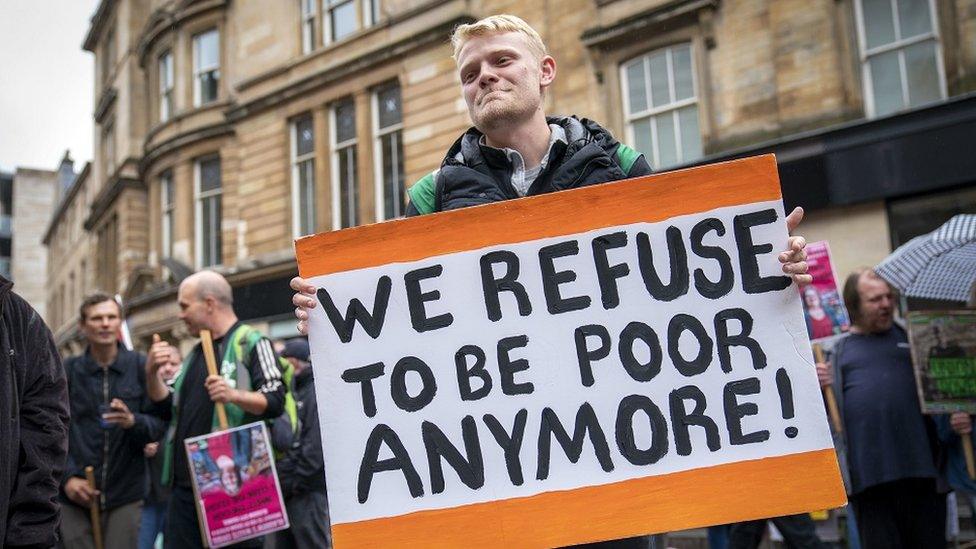Swinney reveals further £615m of spending cuts
- Published
John Swinney expects an "eye-watering" amount of spending cuts and tax rises for Scotland
Scotland's finance secretary has unveiled details, external of a further £615m worth of spending cuts.
The "reductions and reprioritisations" are in addition to another £560m of cuts that were announced in September.
John Swinney said the financial situation facing the Scottish government was by far the most challenging since devolution.
And soaring inflation meant this year's budget was now worth £1.7bn less than when it was introduced last December.
Mr Swinney also said savings needed to be made to offset the impact of Brexit, public sector pay deals and help for Ukrainian refugees.
The measures he announced included reprioritising £400m from the NHS budget in order to provide a "fair pay deal" for health staff - although he stressed that the overall NHS budget was unchanged.
Some £116m of this had been due to be spent on Covid vaccines, testing and PPE, with a further £38m coming from the mental health budget and £63m from "re-phasing and pausing" programmes including the Scottish Trauma Network.
It also includes £65m from primary care services and £70m from "social care and National Care Service re-profiling".
Money will also be taken from budgets across most other Scottish government departments, with Mr Swinney announcing £33m of resource budget savings and £180m of capital savings and financial transaction reductions in his emergency spending review.
The capital savings include delays to new college projects and housebuilding.
And the measures mean there will be £16m less for the broadband rollout to remoter parts of Scotland, while support for bus operators to upgrade their fleets to low emission vehicles will be reduced by £29m.
'Balance the books'
Mr Swinney said the Scottish government did not have the necessary borrowing powers to meet the increased costs that were facing it, or to change income tax rates before the start of the next financial year.
This meant that every additional pound that was spent in one area meant a pound less could be spent somewhere else, he said.
He added: "I must balance the books, but I am committed to doing so in a way that prioritises funding to help families, to back business, to provide fair pay awards and to protect the delivery of public services."
The review was established in the summer to "assess any and all opportunities to redirect additional resources to those most in need, reduce the burdens on business and stimulate the Scottish economy".


The figures being thrown around at Holyrood are not insignificant ones, when you consider the Scottish government's total budget is in the region of £50bn.
A lot of money has gone towards public sector pay deals, which does at least help workers deal with rising prices themselves.
But a worrying amount of cash is simply being lost to inflation, which is wreaking havoc with government budgets as much as household ones.
And to make it worse, this is just the beginning.
Chancellor Jeremy Hunt has warned he will have difficult choices to make in his autumn statement in a fortnight's time.
Mr Swinney then sets his budget for the coming year on 15 December, with many departments braced for real-terms cuts. Holyrood's committees are already hearing grim talk of some services being "hollowed out" or shutting down entirely.
The coming weeks will be where that talk could become a reality, as ministers are forced to follow through on those difficult choices.

Scottish Conservative finance spokeswoman Liz Smith the global financial situation "do not absolve Mr Swinney or his colleagues of responsibility for the position Scotland finds itself in after fifteen years of their government".
She said Mr Swinney had announced "more huge cuts to health, education and justice" but had not touched the budget for another independence referendum, and questioned whether now was the time to be introducing a new National Care Service.
Labour's Daniel Johnson said "chaos" from the UK government had made the situation more difficult.
But he also criticised the number of foreign trips taken by the Angus Robertson, the Scottish government's external affairs secretary.
Mr Johnson said: "I note that the cabinet secretary for external affairs has travelled to eight countries in as many months, clocking up almost 22,000 air miles.
"What cost control measures are being applied to the expenditures of members of the Government and civil servants?"
Mr Swinney's review statement was initially expected within a fortnight of the UK government's infamous mini-budget, which was announced on 23 September by then-Chancellor Kwasi Kwarteng.
Amid the resulting fallout at Westminster, which saw most of the plans reversed and both Mr Kwarteng and Prime Minister Liz Truss lose their jobs, the Holyrood update was delayed in anticipation of a UK government autumn statement scheduled for 31 October.
That was then pushed back to 17 November but the Scottish government decided it could not wait until then to announce its changes.
The Scottish government will announce its budget for next year on 15 December, which will include any changes it intends to make to income tax rates and bands.
- Published7 September 2022

- Published31 October 2022
